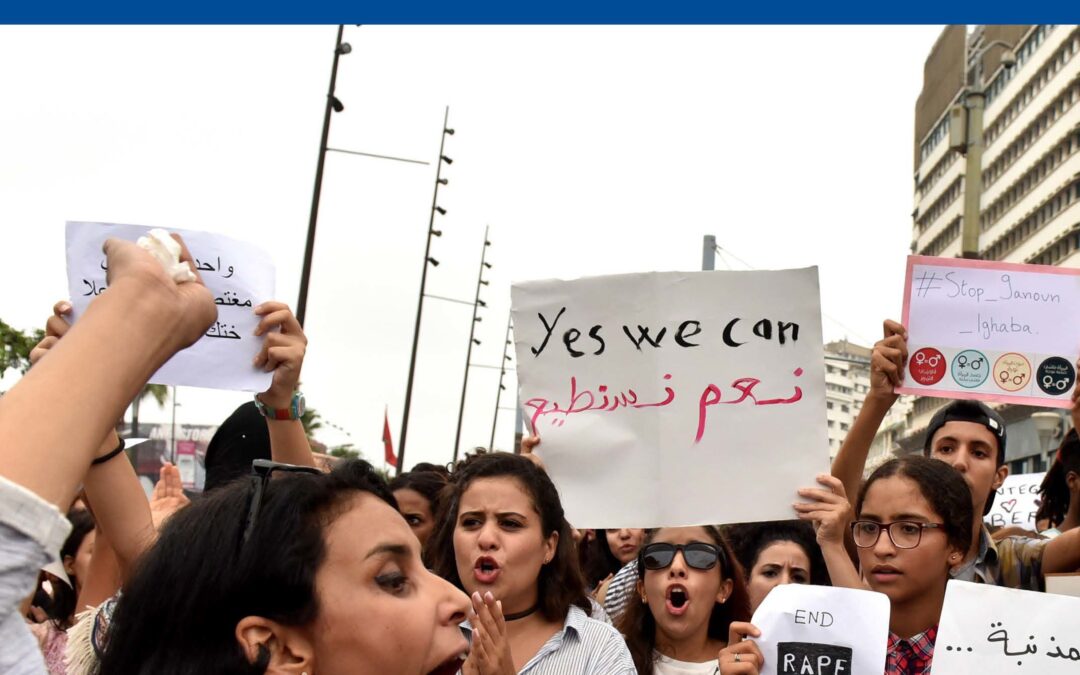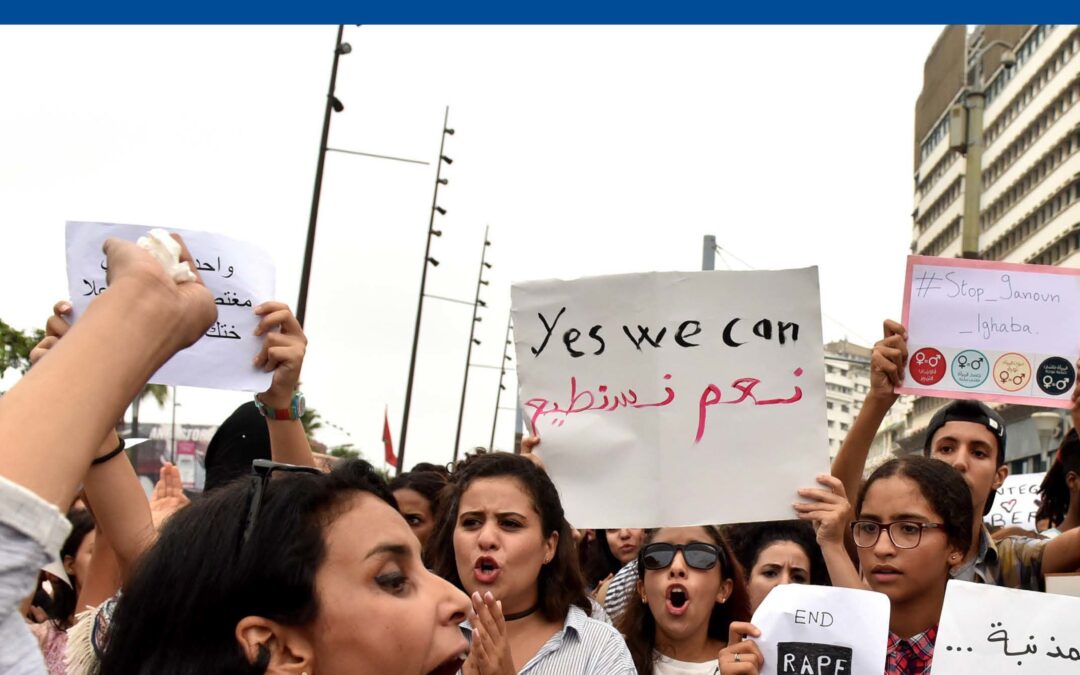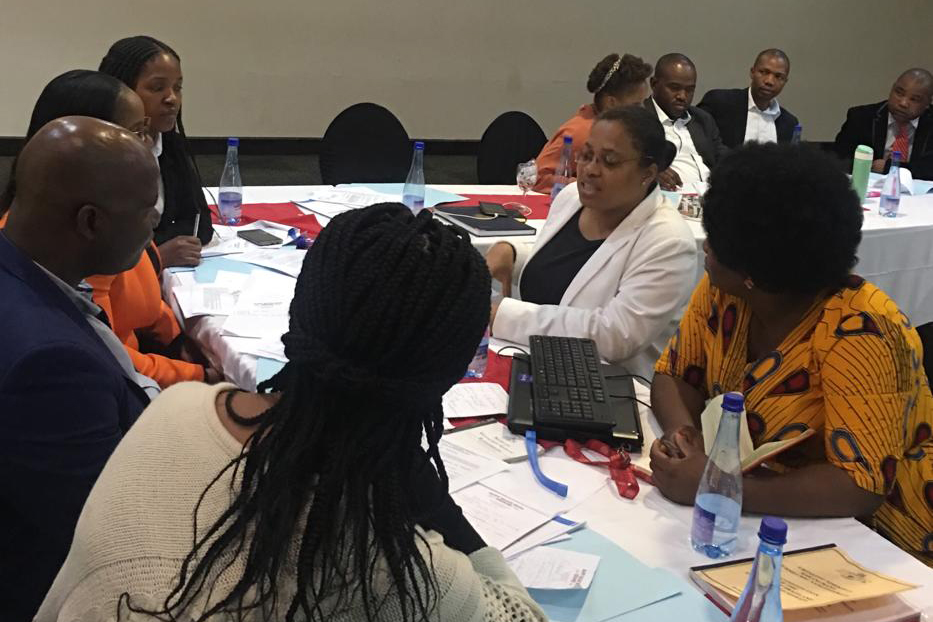
Jun 28, 2019 | News, Publications, Reports, Thematic reports
In a report released today in Rabat, the ICJ called for the removal and eradication of legal obstacles and discriminatory judicial attitudes hindering women’s and girls’ ability to seek justice and redress for sexual and gender-based violence (SGBV) in Morocco.
The ICJ’s report Obstacles to Women’s and Girls’ Access to Justice for Gender-based Violence in Morocco (available in English and Arabic) explores the various obstacles that women seeking justice in Morocco face, and addresses recommendations to the Moroccan government and judiciary with a view to improving access to justice and effective remedies for women and girls who are victims of SGBV.
“The Moroccan authorities should amend Law 103/13 and the Penal Code to ensure compliance with international human rights law and standards. Morocco’s Office of the Public Prosecutor and the country’s judicial authorities, including the High Judicial Council, should ensure that detailed guidelines on investigation and prosecution of SGBV crimes are developed and complied with, and that awareness-raising programmes be rolled out to counter judicial stereotyping and victim-blaming,” said Saïd Benarbia, Director of the Middle East and North Africa Programme at the ICJ.
Notwithstanding the recent adoption of Law 103/03 on combatting violence against women, SGBV has not been adequately addressed; it remains widespread in Morocco, with a profoundly detrimental human rights impact on victims and society at large. Law 103/3 fails to define rape in a manner consistent with relevant international law and standards, with the crime still addressed through the lens of morality and public decency, rather than as a violation of one’s bodily integrity and autonomy; Law 103/3 also fails to criminalize child and early marriage, lending support to this harmful practice.
In addition to discriminatory laws and procedures, women and girls seeking justice and redress as survivors of SGBV in Morocco have to face a judiciary that often harbours biased assumptions, and propounds negative gender stereotypes, including cultural norms rooted in patriarchy.
Against this background, the ICJ’s report analyses how exceedingly lenient sentences – for instance in cases of marital rape – and the heightened risk women and girls face of being charged with consensual extramarital sexual relations deter them from seeking justice and redress in case of physical and sexual abuse of which they may be victims, either at the hands of their husband or of individuals with whom they are not married.
To begin addressing women’s and girls’ predicament in these and other respects related to SGBV, the report calls on the Moroccan authorities to:
- Adopt legislation that recognizes one’s right to sexual autonomy, and that recognizes equal relationships as requiring free and full consent of both parties;
- Adequately define and fully criminalize through a gender-neutral definition acts of rape, including by criminalizing marital rape as a separate offence;
- Repeal Article 490 of the Penal Code criminalizing extramarital sexual relations, and ensure that Article 19 of the Family Code on the minimum age of marriage is stringently observed;
- Enact policies, legislative and procedural measures aiming at enhancing the effectiveness of judicial and other public sector services related to women’s access to justice, including enforcing spousal and child support, providing free legal assistance to victims of SGBV, granting protection orders, and adopting other urgent measures;
- Develop and enforce guidelines on investigating and prosecuting SGBV crimes;
- Develop a national protocol for SGBV-related medical, forensic examinations, and ensure forensic-testing services be available and affordable;
- Provide training and awareness-raising programmes aimed at countering judicial stereotyping, victim-blaming and other harmful practices.
Contact:
Saïd Benarbia, Director of the ICJ Middle East and North Africa Programme, t: +41.22.979.3817, e: said.benarbia(a)icj.org
Additional information:
ICJ Commissioner Martine Comte led the delegation that met with different Moroccan authorities, justice and civil society actors this week in Rabat in order to present ICJ’s report and discuss its findings and recommendations. The ICJ delegation met with Mr Mohamed Aujjar, Minister of Justice; Mr Taoufik El Maimouni, President of the Commission on Justice, Legislation, and Human Rights at the Chamber of Deputies; Mr Larbi Tabit, Secretary General at the Minister of Solidarity, Women, Family and Social Development; Ms Amina Bouayach, President of the National Human Rights Council and representatives of the judiciary and of the civil society.
Download:
Morocco-Obstacles GBV-Publications-Reports-Thematic report-2019-ENG (full report in English, PDF)
Morocco-Obstacles GBV-Publications-Reports-Thematic report-2019-ARA (full report in Arabic, PDF)
Morocco-Women HR report-News-2019-ARA (News story in Arabic, PDF)

Jun 28, 2019 | Nouvelles, Publications, Rapports
Dans un rapport publié aujourd’hui à Rabat, la CIJ a appelé à l’élimination et à l’éradication des obstacles légaux et attitudes judiciaires discriminatoires entravant l’habilité des femmes et des jeunes filles à demander justice et réparation pour violences sexuelles et basées sur le genre au Maroc.
Le rapport de la CIJ Obstacles to Women’s and Girls’ Access to Justice for Gender-based Violence in Morocco (disponible en anglais et en arabe seulement) explore les différents obstacles auxquels sont confrontées les femmes qui cherchent à obtenir justice au Maroc, et adresse des recommandations au Gouvernement et au pouvoir judiciaire marocains afin d’améliorer l’accès à la justice et à des voies de recours utiles pour les femmes et jeunes filles victimes de violences sexuelles et basées sur le genre.
« Les autorités marocaines devraient modifier la Loi 103/03 et le Code Pénal afin d’assurer leur conformité au droit et aux normes internationales relatives aux droits de l’homme. Le parquet et les autorités judiciaires marocaines, dont le Conseil Supérieur du Pouvoir Judiciaire, devraient assurer que des directives détaillées concernant l’enquête et la poursuite des crimes de violences sexuelles et basées sur le genre soient développées et respectées, et que des programmes de sensibilisation soient déployés afin de lutter contre les stéréotypes de genre et le blâme des victimes dans les procédures judiciaires », a déclaré Saïd Benarbia, Directeur du Programme Moyen-Orient et Afrique du Nord de la CIJ.
Malgré la récente adoption de la Loi 103/03 relative à la lutte contre les violences envers les femmes, la violence sexuelle et basée sur le genre n’a pas encore été correctement adressée; elle reste très répandue au Maroc et nuit profondément aux droits des victimes et à la société dans son ensemble.
La Loi 103/03 ne définit pas le viol de manière conforme au droit et aux normes internationales pertinentes: le crime est encore considéré au regard de la moralité et de la décence publique, plutôt qu’en tant que violation de l’intégrité physique et de l’autonomie corporelle d’une personne; la Loi 103/13 est également une opportunité manquée de criminaliser le mariage précoce et d’un enfant, soutenant cette pratique néfaste.
En plus de lois et procédures discriminatoires, au Maroc, les femmes et jeunes filles cherchant à ce que justice leur soit rendue pour les violences sexuelles et basées sur le genre dont elles ont été victimes doivent faire face à un système judiciaire souvent influencé par des présomptions biaisées, et qui véhicule des stéréotypes de genre négatifs, dont des normes culturelles ancrées dans le patriarcat.
Dans ce contexte, comme analysé dans le rapport de la CIJ, des peines excessivement clémentes – par exemple dans les affaires de viol conjugal – et les risques accrus pour femmes et jeunes filles d’être poursuivies en justice sur la base de relations extra-conjugales consentantes dissuadent femmes et jeunes filles de demander justice et réparation pour abus physiques et sexuels dont elle ont été victimes soit des mains de leur époux soit d’individus auxquels elles ne sont pas mariées.
Afin de commencer à adresser les obstacles à l’accès à la justice rencontrés par les femmes et jeunes filles victimes de violences sexuelles et basées sur le genre, le rapport invite les autorités marocaines à :
- Adopter une législation qui reconnaît le droit individuel à l’autonomie sexuelle, et qui reconnait qu’une relation égalitaire exige le libre et entier consentement des deux parties ;
- Définir de manière adéquate et criminaliser dans toutes ses formes et selon une définition neutre sur le plan du genre les actes de viol, y compris en criminalisant le viol conjugal comme une infraction autonome ;
- Abroger l’article 490 du Code Pénal selon lequel les relations sexuelles extra-conjugales constituent une infraction pénale, et assurer que l’article 19 du Code de la Famille concernant l’âge minimal requis pour se marier soit strictement respecté ;
- Promulguer des politiques, mesures législatives et procédurales ayant pour but d’améliorer l’efficacité du système judiciaire ainsi que des autres services du secteur public liés à l’accès à la justice pour les femmes, y compris en faisant appliquer les décisions concernant les pensions alimentaires au conjoint ou aux enfants, en fournissant une assistance juridique gratuite pour les victimes de violences sexuelles et basées sur le genre, en octroyant des ordonnances de protection et en adoptant toutes autres mesures urgentes ;
- Développer et appliquer des directives portant sur l’enquête et la poursuite de crimes de violences sexuelles et basées sur le genre;
- Développer un protocole national relatif aux examens médicaux et médico-légaux dans des cas de violences sexuelles et basées sur le genre, et garantir un service d’analyses médico-légales disponible et abordable ;
- Fournir des programmes de formation et de sensibilisation visant à combattre, au sein du pouvoir judiciaire, les stéréotypes, le blâme des victimes et autres pratiques néfastes;
Informations supplémentaires
Cette semaine à Rabat, une délégation de la CIJ dirigée par la Commissaire Martine Comte a présenté le rapport à plusieurs autorités marocaines, ainsi que des acteurs de la justice et de la société civile afin de discuter de se conclusions et recommandations. La délégation de la CIJ a rencontré M. Mohamed Aujjar, Ministre de la Justice ; M. Taoufik El Maimouni, Président de la Commission Justice, Législation et Droits de l’Homme à la Chambre des députés ; M. Larbi Tabit, Secrétaire Général au Ministère de la Solidarité, de la Femme et du Développement Social ; Mme Amina Bouayach, Présidente du Conseil National des Droits de l’Homme ; ainsi que des représentants du pouvoir judiciaire et de la société civile.
Morocco-Obstacles GBV-Publications-Reports-Thematic report-2019-ENG (rapport en anglais, PDF)
Morocco-Obstacles GBV-Publications-Reports-Thematic report-2019-ARA (rapport en arabe, PDF)

May 30, 2019 | News
On May 29 2019, the ICJ facilitated a workshop with a number of justice sector officials and stakeholders who are active in the implementation of the Sexual Offenses and Domestic Violence Act (SODVA).
Building on previous engagements in 2018 and 2019, the participants decided on a clear plan of action for further coordination towards the eradication of sexual and gender based violence (SGBV) in Eswatini.
Participants in the meeting included representatives from the Office of the Director of Public Prosecutions, the Office of the Deputy Prime Minister, the police, correctional services, the judiciary and the Medical and Dental Association of Eswatini.
The meeting, was opened by ICJ Commissioner and Principal Judge of the High Court of Eswatini, Justice Qinisile Mabuza.
“For too many years, the clamour for this law has been loud; now that we have it, we have to interrogate how efficiently we are using it and check for the gaps that we need to address. Its implementation is in our hands, and we cannot allow ourselves to fail those that need our protection; we cannot fall foul of failing in our duty,” said Judge Mabuza.
A draft report, commissioned by the ICJ, was presented by Nonhlanhla Dlamini, the Director of Swaziland Action Group Against Abuse (SWAGAA).
The report, provided participants with a contextual analysis of challenges faced by survivors of SGBV in accessing the justice system in Eswatini.
ICJ Legal Adviser Timothy Fish Hodgson discussed key provisions of the SODV Act and the need for their interpretation and application consistently with the Convention on the Elimination of Discrimination Against Women.
SWAGAA’s draft report revealed that despite the enactment of the SODV Act significant barriers to access to justice for survivors of SGBV remain.
These include:
- Underreporting of SGBV;
- Stereotyping and discrimination faced by survivors when reporting;
- Partial application of SODV Act due to lack of knowledge on the part of key justice sector actors;
- Under-resourcing, lack of infrastructure and services presupposed by SODV Act which prevents full implementation;
- Continued stereotype-driven assumptions made by courts despite the outlawing of such approaches in the SODV Act;
- Lack of due diligence in the collection of medical evidence;
- A perception on the part of survivors that perpetrators are better taken care of in the prosecution process than survivors; and
- A growing and inaccurate perception of the SODV Act and its purposes, which has been facilitated by misleading media reports.
Participants made practical recommendations of how challenges could be addressed in their particular environments. Stressing the need to ensure continued collaboration and momentum in the implementation of the SODV Act, ICJ Africa Director Arnold Tsunga observed that: “Whether this process actually builds towards better protection from SGBV for the marginalized in Eswatini and the SODV Act’s impact is dependent on how participants in this platform and other officials are able to adopt practical measures and implement them effectively.”

Mar 15, 2019 | News
The ICJ called on the Government of Malaysia to take immediate steps to protect the right of all persons in the country to freedom of expression and assembly, after seven organizers of the International Women’ Day (IWD) March were summoned for questioning by police authorities on 14 March 2019.
“It is very concerning that the Malaysian authorities continue to rely on repressive legislation to control and undermine freedom of expression and freedom of assembly in the country,” said Emerlynne Gil, ICJ’s Senior International Legal Adviser.
The Women’s March took place in Kuala Lumpur, on 9 March 2019. The demands of the participating groups included an ‘end of all violence based on gender and sexual orientation’, the ban of all child marriages, and the setting of RM1,800 as a minimum wage.
A statement by the Dang Wangi District Police Deputy Chief identified the organizers as individuals who had spoken at an ‘LGBT’ rally.
There were reportedly taken in for questioning on 18 March for potential violations of Section 4(1) of the Sedition Act and Section 9(5) of the Peaceful Assembly Act. They remain at risk of being charged for these offences.
The ICJ considers the Sedition Act 1948 and the Peaceful Assembly Act 2012 to be incompatible with international standards. The ICJ has previously called on the Government of Malaysia to abolish both laws, which have historically been used to silence voices of those challenging governmental policy.
The laws place restrictions on the exercise of freedom of expression that are overbroad, unnecessary and disproportionate, and inconsistent with rule of law and human rights principles. The Pakatan Harapan Government committed itself to abolishing the Sedition Act 1948 and the Peaceful Assembly Act 2012, but has not done so to date.
“The vague definition of ‘seditious tendencies’ in the Sedition Act has been used as a tool for silencing government critics and human rights defenders by previous administrations. It is disappointing that the Malaysian authorities have ended the moratorium on the use of the Sedition Act 1948, and continue to use it, instead of moving towards its abolition,” said Gil.
According to international standards, any limits on the right to peaceful assembly should not require prior authorization by the authorities. Notification requirements must not be unduly bureaucratic and be used only for the purpose of allowing the authorities to facilitate the exercise of the right to peaceful assembly, and to protect public safety.
In a 14 March statement, the organizers claimed to have been in regular communication with the police and to have been in compliance with the relevant notice provisions of the Peaceful Assembly Act.
The ICJ calls on the Malaysian authorities to end any investigations targeting the organizers of the Women’s March pursuant to the Peaceful Assembly and Sedition Act. It also calls on the Government to abolish the Peaceful Assembly Act and the Sedition Act.
Contact
Emerlynne Gil, ICJ Senior International Legal Adviser, t: +66 840923575, e: emerlynne.gil(a)icj.org
Malaysia-Womens March-News-web stories-2019-ENG (full story with additional information, in PDF)

Jan 3, 2019 | Advocacy, News, Non-legal submissions
On 30 December 2018, the ICJ and the International Service for Human Rights (ISHR) jointly submitted a communication to the Committee on the Elimination of Discrimination against Women (CEDAW Committee) directed against Thailand.
They did this as a State Party to the Optional Protocol to the UN Convention on the Elimination of All Forms of Discrimination against Women (the CEDAW Convention) on behalf and with the consent of Angkhana Neelapaijit, regarding the alleged enforced disappearance of her husband, Somchai Neelapaijit.
Somchai Neelapaijit, a prominent lawyer and human rights defender, disappeared after being stopped on a road in Bangkok on 12 March 2004 and pulled from his car by a group of men. He has not been seen since. More than 14 years after his alleged enforced disappearance, Somchai’s fate and whereabouts remain unknown.
Prior to his disappearance, Somchai had been defending clients from Thailand’s southern border provinces and had been doing extensive work to advocate for the rights of persons accused of terrorism, and to highlight the treatment of Malay-Muslims in the region.
The joint communication by ICJ and ISHR to the CEDAW Committee submits that Thailand has breached Articles 2(b)(c)(f), 5(a)(b), 15(1) and 16(1)(c)(d) of the CEDAW Convention, which relate to the rights of women to substantive equality and protection from all forms of discrimination, including in all matters relating to marriage and family relations, as well as to their right to an effective remedy for violations of the abovementioned provisions.
The communication further highlights the impact of enforced disappearance on family members of a disappeared person, noting its disproportionate impact on wives and female relatives, as most cases of enforced disappearance in Thailand involve male victims.
In addition to the CEDAW Convention and its Optional Protocol, Thailand is a party to a number of other international human rights instruments, including the International Covenant on Civil and Political Rights and the Convention against Torture and Other Cruel, Inhuman or Degrading Treatment or Punishment. In January 2012, Thailand also signed the International Convention for the Protection of All Persons from Enforced Disappearance (ICPPED), thereby committing itself to refrain from acts that would defeat the object and purpose of that treaty, namely the prevention and prohibition of the crime of enforced disappearance.
The ICJ has consistently called upon the Thai authorities to comply with their obligations under international human rights law to independently, impartially and effectively investigate the case of Somchai Neelapaijit and all other reported cases of enforced disappearance, and provide the families of the victims in such cases with access to effective remedies and reparations, including regular updates on the status of the investigations.
The ICJ has also submitted recommendations to the Thai authorities on the current Draft Prevention and Suppression of Torture and Enforced Disappearances Act, highlighting the crucial need for a domestic law to define and criminalize enforced disappearance and torture in line with Thailand’s international obligations.
Thailand-Communication to CEDAW-Advocacy-2019-ENG (full submission, in PDF)
Contact
Livio Zilli, ICJ Senior Legal Adviser & UN Representative, email: livio.zilli(a)icj.org
Read also
Thailand: ICJ submits recommendations on draft law on torture and enforced disappearance amendments
Thailand: ICJ marks 14th year anniversary of the enforced disappearance of Somchai Neelapaijit’
Thailand: ICJ, Amnesty advise changes to proposed legislation on torture and enforced disappearances
Thailand: pass legislation criminalizing enforced disappearance, torture without further delay
On the 10th anniversary of Somchai Neelapaijit’s alleged disappearance, the ICJ released a report ‘Ten Years Without Truth: Somchai Neelapaijit and Enforced Disappearances in Thailand’ documenting the legal history of the case.









